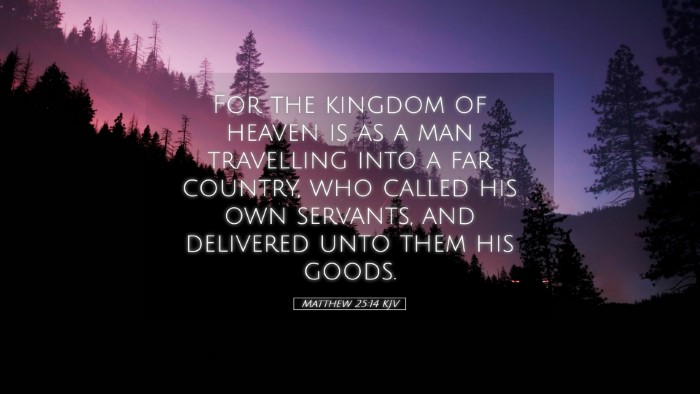Matthew 25:14 - Commentary & Insights
Verse Overview: Matthew 25:14 states, "For it will be like a man going on a journey, who called his servants and entrusted to them his property." This parable, known as the Parable of the Talents, emphasizes the responsibility and stewardship expected from believers.
Contextual Background
The Parable of the Talents is situated within the Olivet Discourse, where Jesus teaches His disciples about the Kingdom of Heaven and the nature of His second coming. This context is crucial for understanding the urgency and seriousness of the teachings presented.
Insights from Public Domain Commentaries
1. Matthew Henry's Commentary
Matthew Henry emphasizes the following points in his commentary on this verse:
- Master and Servants: The 'man' represents Christ, who entrusts His servants (believers) with responsibilities. This relationship underscores the trust placed in believers to contribute to the Kingdom of Heaven.
- Talents as Resources: The 'property' given reflects not only material wealth but also spiritual gifts, opportunities, and responsibilities. Each servant is endowed according to their abilities, highlighting God’s just distribution.
- Application of Resources: Henry draws attention to the expectation that a servant must diligently apply the resources entrusted to them. The underlying message is that inaction or neglect is a betrayal of the trust received.
2. Albert Barnes' Notes on the Bible
Albert Barnes provides several valuable insights regarding this verse:
- The Journey of the Master: The 'journey' symbolizes the time of Christ’s absence from the earth, during which the church is expected to manage its affairs faithfully.
- The Nature of the Trust: The talents ('money' or 'resources') refer to different abilities and positions of service within the church. It signifies that each believer has a unique role and gifts.
- Moral Responsibility: Barnes emphasizes that servants are mandated to use their talents responsibly. The parable warns against laziness and points to divine accountability for stewardship.
3. Adam Clarke's Commentary
Adam Clarke offers a more detailed exploration of the implications of this verse:
- Symbolism of the Servants: The servants not only represent the apostles and leaders of the church but also every believer. Clarke illustrates this by showing how each is equipped differently for various ministries.
- Investment of Gifts: Clarke stresses that the emphasis is on how the servants choose to invest what they have received. The expectation is not complacency but active engagement in expanding God’s kingdom.
- Judgment and Accountability: The concept of accountability is crucial. Clarke posits that upon the master's return, there will be an assessment, which foreshadows Christ’s judgment of believers at His return.
Theological Implications
This verse holds significant theological implications for understanding stewardship, the nature of God’s gifts, and the expected responsibility of believers. It calls to mind several key topics:
- Stewardship: It reinforces the concept that everything believers possess is entrusted to them by God, therefore they are stewards rather than owners.
- Grace and Responsibility: The varying distribution of talents showcases God's grace. It is a reminder that believers should not compare their abilities to others but be faithful with their own gifts.
- Kingdom Expansion: This parable emphasizes the proactive role of believers in the expansion of the kingdom of God, affirming that they are active participants in God’s redemptive plan.
Practical Applications
For pastors, students, theologians, and Bible scholars, the practical applications of this verse are manifold:
- Identifying Gifts: Individuals are encouraged to identify and cultivate their spiritual gifts and abilities actively, facilitating growth within their communities.
- Community Engagement: Churches should foster environments where members feel empowered and motivated to use their God-given talents for service both within and outside the church.
- Preparation for Accountability: The imminent return of Christ serves as a reminder for diligent preparation and active engagement in kingdom work, fostering a sense of expectancy and urgency among believers.


